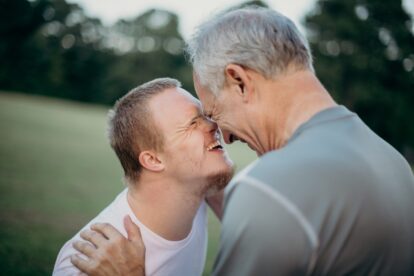How to support persons with disabilities
In this blog, we look at how to support persons with disabilities, including supporting their mental health.
Some of these tips can feel awkward the first time. We naturally try to avoid awkwardness and may unknowingly avoid interacting with persons with a disability, creating a real feeling of exclusion in others. Once you get over that first interaction, it quickly gets easier. Don’t let the awkwardness get in the way of making a new connection.
Don’t forget that mistakes happen! Simply taking the first step of asking, and then following their lead can go a long way.
Ask first and follow their lead
Don’t assume a disabled person needs help. First, ask if there is anything they need from us to support them. They are the experts on their needs and how to best meet them. If they do ask for help, ask for specific instructions if you’re unsure.
Speak clearly, listen well
If you are working with a person who has a developmental or cognitive disability, use clear sentences, simple words and be concrete. Try to match their pace and vocabulary to build rapport. Allow people with speech impairments to finish their sentences. Don’t talk for them or interrupt.
Speak directly to people
Whether you are talking to someone who is deaf but uses an interpreter, or someone who is using a wheelchair, talk directly to them, rather than to the person supporting them.. Also, if you will be speaking for some time with a person in a wheelchair, find a spot to sit down so they don’t have to strain their neck to look up at you. Being on the same level as someone can help you to build rapport.
Be aware of personal space
For those who use mobility aids such as a wheelchair, walker or cane, these are a part of their personal space. Don’t touch, move or lean on mobility aids including pushing someone’s wheelchair without their consent. This is also important for safety.
When meeting up, check accessibility
Confirm a meeting place in advance and send detailed instructions on the accessibility of the venue. Ask if there is anything you can do to prepare to make sure everyone is able to participate fully. Consider meeting online, if appropriate for all involved.
Additional support for persons with disabilities in Suffolk
Suffolk Learning Disability Partnership
An independent partnership supporting people with learning disabilities to live good lives as part of their community, with the right support, at the right time, from the right people.
Suffolk Coastal Disability Forum
An organisation that works and campaigns for better lives for people with disabilities. The forum creates opportunities for people with disabilities, their families and disability organisations to listen, learn and consult with them.
A people-led advocacy organisation, working with people with learning disabilities and autism across Suffolk.
A national charity that supports people with learning disabilities, mental health needs and physical disabilities to take control of their lives.
A disability rights organisation based in Norfolk and Suffolk, which exists to support people of any age who face disabling barriers and are dedicated to making their voices heard.










